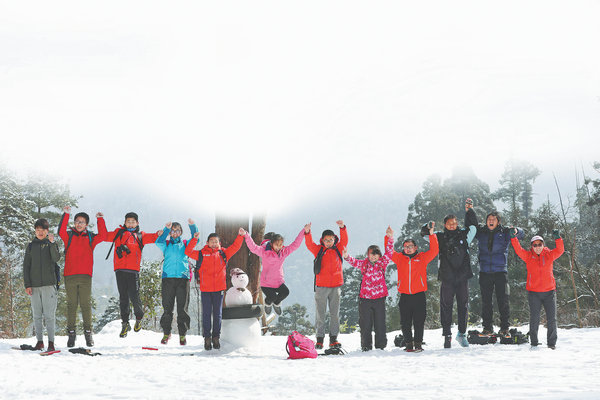

Guo says that he is not a professor who puts an emphasis on repeatedly setting exams to grasp knowledge.
It reflects his education philosophy. He says he wants to enable people to learn about the world around them and to avoid being at a loss in a natural environment.
"Only then can people better face their problems, analyze them, solve them, and enhance their creativity," he says.
Last year, he set up a Practical Ecology course, in which he took students into the wilderness and to museums to survey, observe and monitor animals.
During a session where he was meant to expose them to birds in the city, he found some students were fearful around wild animals. He encouraged them to rescue three fledglings and make nests for them, before transferring them to their new homes by hand.
"I want my students to know that we survive because of biodiversity, and that everyone is a beautiful part of it," Guo says.
Having taught at university for decades, Guo launched his online project for the same reasons as his Practical Ecology course.
He noticed that young people today are too afraid of nature.
"Many people scream at the sight of small insects," he says, adding that it perplexed him.
"When and how did humans become like this?"
Guo has been involved with flora and fauna since he was a child.
He was born in Bo'ai county, Central China's Henan province. His parents worked in the agriculture and forestry sector, so he was exposed to a great deal of knowledge about related fields.
This childhood predisposition saw him pursue biology for his undergraduate studies at Henan Normal University in the 1980s. And then he went on to explore a similar discipline at postgraduate level, before studying for his doctorate in ecology at East China Normal University. After completing the latter in 2004, he began teaching at Tongji University.
During his studies, Guo found that learning could be a fun experience.
He still remembers his doctoral research at Zhoushan, a maritime city in Zhejiang province.
"I roamed around on my bicycle, before lying on the grass to listen to the waves," he recalls, adding that he enjoyed watching the clouds and observing the birds and flowers.
"I really had a lot of fun."
After becoming a university professor, Guo has mainly taught zoology and ecology on campus, while outside the classroom, he has been preaching what he preaches — getting in touch with nature.
Every year, Guo spends a considerable amount of time outdoors.
He has conducted field research on the Bengal tiger, Forest musk deer, takin and Asian black bear in Medog county of Tibet autonomous region and observed the Oriental scops-owl at the raptor rescue center in Dali Bai autonomous prefecture of Yunnan province.
When surveying in Tianmu Mountain of Zhejiang province, he stunned people around him by grabbing a poisonous Stejneger's pit viper by the neck in one split-second hand movement.
Guo's footprints have also been left on Wuyi Mountain in Fujian province, Naozhou Island of Guangdong province, as well as in South Africa, Sweden, France and Australia.
Guo has also given guidance at nature science activities and summer camps across the country. And he travels to various national reserves and national parks to offer training for staff members.
He has made it a personal mission to help people regain the courage to develop a relationship with nature through the internet platform, which has inspired a great number of young people.
Guo has found that people become happy when they are in a natural environment.
He recounts the time when one of his seemingly timid students was immersed in a sea of rapeseed blossoms during a spring expedition at Chongming Island, Shanghai, burst into singing, impersonating the late Italian tenor Luciano Pavarotti in front of a crowd of onlookers.
"Nature has a power to awaken people's feelings and expressions of beauty," Guo says.
"This appreciation of beauty is engraved in our genes. It may usually be switched off, yet sparks to life when venturing into nature."
Although the living conditions are simple and crude, and peril might lurk behind every tree during natural exploration, Guo has come to see it as a fun and irreplaceable part of his life.
"Nature is my first love, and will, eventually, be my last," Guo says.